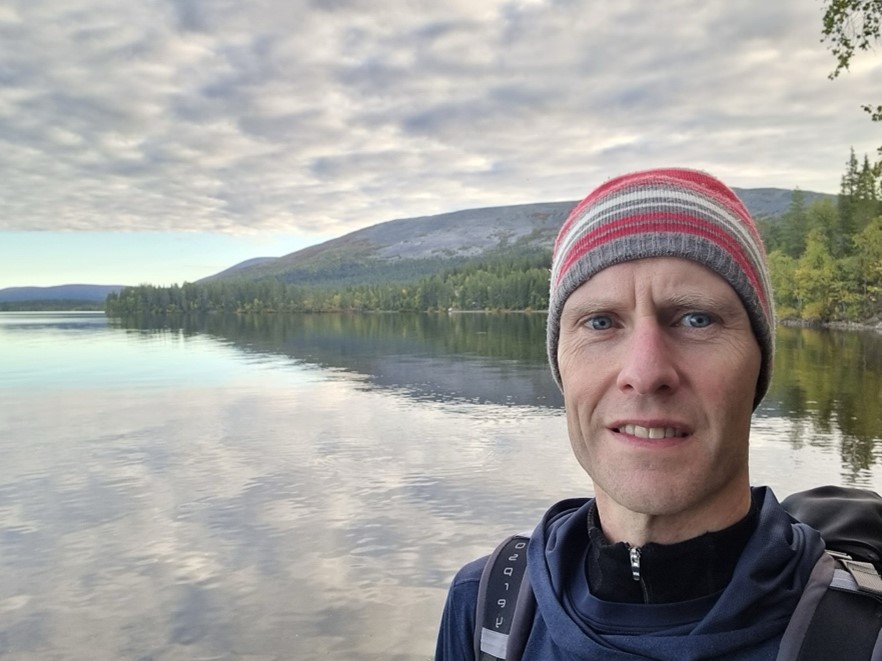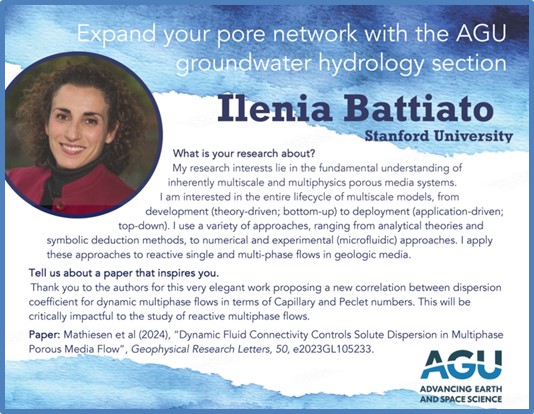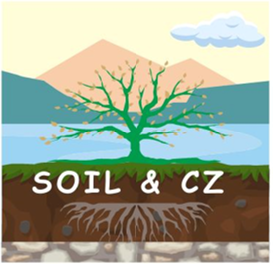| |
In this Issue:
-
From the Section President: President Elect Venkat Lakshmi
-
Fellow Speaks: David Hannah
-
Technical Committee Update: Groundwater
-
Technical Committee Update: Soils Processes and Critical Zone
-
Take a Survey About Sharing Community Science
- Information, Conferences and Links (AGU24!)
|
| |
|
| |
50 years of the UNESCO International Hydrology Programme (Venkataraman Lakshmi, President-elect, AGU Hydrology Section)
|
| |
|
| |
On 3 June, 2024, the United Nations Educational Scientific and Cultural Organization (UNESCO) Intergovernmental Hydrology Programme (IHP) celebrated their start of the 50th anniversary. The UNESCO IHP mission was founded in 1975 to bring together countries of the world for water research, management, capacity building and education. A scientific colloquium was organized at the UNESCO headquarters in Paris and brought together around 100 participants with about 12 keynote speakers and 15 panelists for five moderated sessions stretching over 8 hours. There were interesting discussions on all aspects of hydrology to determine the path forward to take stock of the present and the challenges and opportunities. The science of hydrology has evolved greatly over the past 50 years with the advent of sophisticated models, observation networks, satellite remote sensing and enhanced mathematical methods such as data assimilation and artificial intelligence and machine learning. There is acceleration of the hydrological cycle and non-stationarity of hydrological processes and the fact that surface water is only a very small fraction of available fresh water makes predictions a challenging task. The connections between the hydrological processes and society as an interdisciplinary science with socio-economic impacts are central to the effective water management and scaling up from local to regional to global scales. The importance of the impact of climate change (and the use of global climate models/GCMs and climate change adaptation) on the hydrological cycle and the observations of hydrological extremes (floods, droughts, wildfires, permafrost thaw and wildfires) have scientific and societal impacts. The role of in-situ observations for model and satellite observation calibration and validation has become a major player in the era of dwindling observing networks. Training and capacity building are quite important as there are new sensors and models. The need for using satellite-derived global precipitation due to the paucity of rain gauges in many parts of the world is important for hydrological predictions and water resources management. Groundwater is an important component of the hydrological cycle that cannot be easily quantified using observations or models and yet constitutes an important source of water for societal consumption. The engagement of citizens and stakeholders was identified is one of the major emerging challenges and opportunity for the IHP to move the science of hydrology forward with open access to observations, data and models. This will aid in the co-creation of water knowledge which will benefit society and narrow the data gap and improve the trust in water data and science, avoid transboundary water conflicts and help in creation of the next generation of water scientists.
|
| |
|
| |
Fellow Speaks: David Hannah
|
| |
|
| |
The honour of becoming an AGU Fellow was made possible by wonderful mentors, collaborators, students, friends, and family. I appreciate being asked to share my life lessons and strategies with the next generation. I believe collaboration is the bedrock of great (and fun) science, so I share my thoughts on developing
partnerships and networks.
My experiences. My research spans water cycle processes, hydrological events (flood, drought, water quality) and water-related impacts under climate and other drivers of change. I seek to advance sustainable management of freshwaters to enhance ecosystem and human resilience. This is interdisciplinary research wherein collaboration is essential. Working across boundaries has allowed me to advance
“understanding of the links between river flow, temperature, ecohydrology and climate” (from Fellow citation).
 Why collaborate?
Why collaborate? There are various benefits to be gained from research collaboration and networking. The purpose of collaboration differs depending on the project; therefore, you may need to evolve your network to achieve intended outcomes. Benefits of collaboration include: developing better ideas and skills (to elevate research quality and your competency); obtaining feedback on your work (e.g. for gauging originality of research); gaining inspiration and motivation from others; getting things done together in teams (through access to wider information, resources and support); diversifying views (to hear all the voices and broaden your thinking); and communicating your work and profile raising (to gain recognition and improve career prospects).
What life lessons have I learnt about networking? Do not be shy or embarrassed to seek collaborations to address complex problems. Simply using networking to raise profile is not enough; focus on quality of connections and be active with interactions for true collaboration. Create your own serendipity by getting out there (e.g. through AGU and other societies); do not expect opportunities to come to you. Ask for advice and support in networking from ‘mentors’ (for vertical/ upwards connections) and build peer support networks (in horizontal connections). Social media, blogs and other online communication tools can be an efficient way to create your virtual network (to follow-up in person). Trust is paramount; and it is built by listening, volunteering and encouraging reciprocity. Reliability and interactivity are key too. Clear communication with a focus on common goals and clear, shared, mutually beneficial outcomes help build trust as well as equitable partnerships. Seek to work with people you respect, while remembering it is a small world (so be guarded in sharing views on personalities). It may take time to develop trusted collaborations; but these investments usually pay dividends in the longer term.
Once you have made connections, your work is not done. It is important to follow-up on initial links. You can maintain and deepen existing connections through regular contact, which can be built into your daily routine. Reviewing and harnessing the evolving power of your network will help you deliver on current and plan future goals for collaboration. Once established, you can give back by helping others and making your own ‘network of networks.’ It is important and rewarding to support other people in becoming successful in themselves.
I believe through better networking and collaborations we can embody AGU’s values and vision of a thriving, sustainable, and equitable future powered by discovery, innovation, and action. Not only has building collaborations and networks been the most rewarding components of my career, but it has been also the most fun! I wish you every success in your collaborative research endeavours.
|
| |
|
| |
|
Technical Committee Update - Groundwater
|
| |
|
| |
Greetings from the Groundwater Technical Committee (GWTC). While you might find our heads buried in the sand – we take it as a compliment – the GWTC is pleased to bring to the surface news and new opportunities. Our energetic leaders Pania Newell (Chair) and Bo Guo (Deputy Chair) have maintained a regular biweekly newsletter, sharing engagement opportunities and conference listings across professional societies, as well as celebrating successes with fellow members of the groundwater community. These efforts are amplified by Social Media Officer Tianyuan Zheng.
If you have followed us on social media @AGU_GWHydro, you will discover that we have continued to build our ‘Pore Network’ by featuring various members of the groundwater community in the form of a splash page that is shared in our newsletter and on social media. Below we provide an example featuring our newest TC member Ilenia Battiato. The Pore Network initiative is not limited to GWTC members. We welcome groundwater-inspired submissions from across the AGU community and across career stages. Simply fill out this brief Google Form if you would like to be featured (link).
We have several #AGU24 sessions in the making, comprising a mix of perennial and emerging topics including but not limited to: pore-scale physics and geomechanical processes, energy production and carbon storage, contaminant remediation and waste disposal, mixing and reaction in heterogeneous subsurface environments, surface water-groundwater interactions, and applications of artificial intelligence and machine learning to enhance understanding of subsurface processes. We will keep you updated, via social media, on late-breaking sessions and/or novel sessions that pertain to groundwater as we approach the annual meeting.
We are excited to announce that we are accepting submissions for our annual student contest. The contest aims to spotlight students interested in sharing their passion for groundwater hydrology. To enter the contest, you need to write a brief (300 words and 2 graphs) description of one thing (e.g., journal article, book, story, movie, experience, etc.) that ignites your interest in groundwater hydrology. Please label your description with <your last name_AGU24> and submit it to this link by 30 September. In early October, 3 winners will be selected to receive a prize each (amount to be announced) to support their AGU24 Annual Meeting travel or other educational investments. The winners will also be announced at a GWTC networking event at the AGU24 Annual Meeting.
Finally, we are organizing a GWTC networking event for students, postdocs, and senior researchers in the groundwater community at the AGU24 Annual Meeting. The goal is to help early-career researchers build connections with potential collaborators and mentors. For more information, please contact Sidian Chen ([email protected]).

|
| |
|
| |
Technical Committee Focus: Soils Processes and Critical Zone
|
| |
|
| |
The
Soils Processes and Critical Zone Technical Committee is dedicated to providing a dynamic community of communication to advance understanding of the interface between earth and atmosphere. At the AGU23 Annual Meeting, we welcomed several new members and discussed the activities to be organized at the AGU24 Annual Meeting.
At the AGU23 Annual Meeting, our committee co-organized a topic session in collaboration with the
International Soil Modeling Consortium (ISMC), entitled “Advances and Challenges in Soil and Critical Zone Science." The
oral and
poster sessions brought together critical zone and soil scientists from diverse backgrounds, with foci related to hydrology, soil biogeochemical cycle, terrestrial ecosystem, geophysics, climate and Earth System Models, and discussed current innovations and challenges in field techniques, interpretations, and models.
This year, we plan to create a “Guide to Soil Processes and the Critical Zone,” with a brief introduction and links to relevant AGU24 topic sessions in Hydrological Sciences (distributed via AGU Digest) and
webinars related to Soil Processes and the Critical Zone. For more information about our committee and ways to become involved (e.g., joining our community, organizing AGU topic sessions and social events), please
visit our website or reach out to
Jingyi Huang,
Rose Abramoff (Vice-Chair), or any members.
The
Soils Processes and Critical Zone Technical Committee promotes the understanding of soils at the interface of biogeochemistry, critical zone science, and hydrology within AGU. Our aims are to broaden understanding of critical functions and ecosystem services of soils in Earth Systems, integrate the interests of soils across AGU sections, and provide context for the following key roles of soil:
- Soil is a functioning, complex natural system with unique characteristics that cannot be deduced from a collection of its constituents or individual processes.
- Soil is a thin mantle of life covering much of the terrestrial surface and acting as the planet’s life support system; mineral weathering in soils controls nutrient release and occlusion.
- Soil is the most biologically active compartment of the biosphere, hosting Earth’s largest pool of biodiversity.
- Soil, with its related biota, is Earth’s recycling system, providing most of our needs for food, feed, fiber, and energy, while forming a global biogeochemical cycle of C, N, and P and serving as the largest terrestrial stock of organic carbon.
- Soil provides essential ecosystem services such as provision of fresh and clean water, essential for human primary needs of drinking water and food production, and functions as a water purification system.
Current committee members: Jingyi Huang, Chair (University of Wisconsin-Madison); Rose Abramoff, Vice-Chair (Ronin Institute); Kathe Todd-Brown (University of Florida); Alfred Hartemink (University of Wisconsin Madison); Avni Malhotra (Pacific Northwest National Laboratory); Binayak Mohanty (Texas A&M University); Dani Or (ETH Zürich and University of Nevada Reno); Ester Sztein (National Academy of Sciences and Geological Society of America); KC Carroll (New Mexico State University); Markus Flury (Washington State University); Michael Young (University of Texas, Austin); Salvatore Calabrese (Texas A&M University); Sean M. Schaeffer (University of Tennessee); Sushant Mehan (Colorado State University); Umakant Mishra (Sandia National Laboratories); Fereidoun Rezanezhad (University of Waterloo); Yang Lin (University of Florida); Felix Ogunmokun (University of California Davis); Xi Zhang (Louisiana State University); Jie Hu Student Representative (University of Wisconsin-Madison); Achla Jha Student Representative (Texas A&M University).

|
| |
|
| |
Take a Survey About Sharing Community Science
Do you work with communities? Do you want to share and publish your community science work? AGU’s Community Science Exchange wants to hear from you! Take their short,
anonymous survey
to tell them how you’d like to share your community science materials and inform development of a resource hub.
|
| |
|
| |
AGU is a global community supporting more than half a million advocates and professionals in the Earth and space sciences.
|
| |
|
|
|